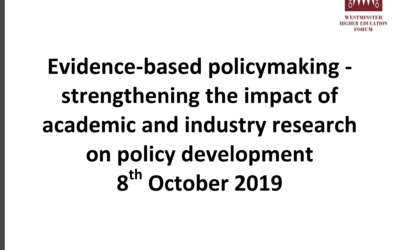Further Reading and Resources:
- Athey, S. (2017) Beyond Prediction: Using Big Data for Policy Problems. Science, 355, 483–485.
- Schrape, J.-F. (2017, May) Open Source Projects as Incubators of Innovation. From Niche Phenomenon to Integral. SOI Discussion Paper 2017-03.
- Baack, S. (2015) Datafication and empowerment: how the open data movement re-articulates notions of democracy, participation, and journalism. Big Data Soc., 2.
- Web Foundation. (2017, May) Open Data Barometer, Global Report Fourth Edition. The World Wide Web Foundation.
- Janssen, M., Konopnicki, D., Snowdon, J.L. and Ojo, A. (2017) Driving public sector innovation using big and open linked data (BOLD). Syst. Front., 19(2), 189–195.
- Safarov, I., Meijer, A. and Grimmelikhuijsen, S. (2017) Utilization of open government data: a systematic literature review of types, conditions, effects and users. Polity, 22, 1–24.
Predictive & Behavioural Analytics
Closely related to Big Data is Behavioural and Predictive analytics. These focus on providing insight into the actions of people through the analysis of large and varied data sets to uncover hidden patterns, and unknown correlations, to help make informed decisions
Behavioural Analytics centres on understanding how consumers act, and why, enabling predictions about how they are likely to act in the future. It allows providers in the private or public sector to make the right responses to the right consumer segments at the right time. Mainstream private sector uses are in eCommerce platforms, online games, web and mobile applications, and the IoT.
Predictive Analytics is the practice of extracting information from historical and real-time data sets to determine patterns and predict future outcomes and trends. Predictive analytics ‘forecasts’ what might happen in the future with an acceptable level of reliability, and includes what-if scenarios and risk-assessment. The defining function is the predictive score (probability) for an agent (individual, vehicle, machine, organisational unit, etc.) to aid with decision making in complex organisational processes. A representative example would be ‘credit scoring’ in financial services that uses customer’s credit history and current data to rank their likelihood of future credit payments on time. These technologies also show significant potential to aid decisions in government operations including law enforcement.
Related Papers and Publications

Algorithmic Government - The Computer Journal
Paper #02
Paper #03
Paper #03

Next GovTechLab Event
Latest News
GovTech Lab’s CTO Speaking at the World Economic Forum: Creating a Trusted Global Cryptocurrency (3—4 November 2019 Dubai)
GovTech Lab's CTO was invited to speak at the World Economic Forum's 'Annual Meeting of the Global Future Councils' (3—4 November 2019 Dubai, United Arab Emirates), on the subject of Creating a Trusted Global Cryptocurrency. Dr. Cathy Mulligan responded to the...
read moreUCL Digital Ethics Forum Event: Materialising the invisible labour of the data chain (21st Nov. 9.15 – 12.30 pm)
UCL Digital Ethics Forum: Materialising the invisible labour of the data chain 21st November, 9:15 am -12.30 pm Hosted by: Dr. Jenny Bunn (UCL Information Studies) We live in an increasingly data-driven society, where data is becoming a global asset at the same time...
read moreOpportunities for embedding evidence-based policy across Government (Zeynep Engin Address to Westminster Higher Education Forum)
On the 8th of October (2019) GovTech Lab’s Dr. Zeynep Engin addressed the Westminster Higher Education Forum Keynote Seminar: Evidence-based policymaking - strengthening the impact of academic and industry research on policy development. Zeynep’s address can be found...
read more



